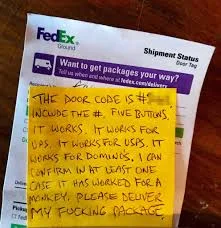Imagine this scenario: you receive a message that you’ve won $20 million dollars. Exciting, right? But then the twist comes—FedEx wants $300 to deliver your winnings. Is this a legitimate charge, or is it a scam? Let’s dig into this situation and shed light on why you should be cautious.
The Red Flags of This Scenario
At first glance, this situation seems outrageous. Why would a legitimate company like FedEx ask for such a hefty fee to deliver winnings? Here are some key red flags to consider:
- Unusual Charges: Legitimate lottery or prize organizations typically do not require winners to pay upfront fees for delivery.
- Too Good to Be True: If something seems too good to be true, it probably is. A $20 million prize should not come with unexpected costs.
- Lack of Verification: Genuine lotteries usually provide official communication and verification processes. If you cannot verify the source, be skeptical.
These warning signs should trigger immediate caution.
Understanding the Scam
Scammers often use tactics that exploit people’s excitement over winning money. Here’s how they typically operate:
- Initial Contact: You receive a call or email claiming you’ve won a large sum.
- Payment Request: To claim your winnings, you must pay a fee for taxes, delivery, or processing.
- Pressure Tactics: Scammers may rush you, claiming you need to act quickly to secure your prize.
The reality? Once you pay, the scammers vanish, and your money is gone.

Statistics on Lottery Scams
According to the Federal Trade Commission (FTC), millions of Americans lose money each year to lottery scams. In 2020 alone, consumers reported losses of over $3 billion to various types of fraud, including lottery and prize scams.
Moreover, a survey by AARP found that 1 in 10 adults aged 50 and older reported being targeted by lottery scams. This highlights the prevalence of these scams and the importance of awareness.
How to Protect Yourself
So, how can you protect yourself from falling victim to such scams? Here are some tips:
- Research the Lottery: If you receive a notification about a lottery win, research the organization. Check their official website for verification.
- Never Pay Upfront Fees: Legitimate winnings should not require you to pay fees upfront. If someone asks you to, it’s likely a scam.
- Trust Your Instincts: If something feels off, it probably is. Listen to your gut feeling.
By following these guidelines, you can help safeguard yourself against potential scams.

Personal Experience with Scams
I once received an email claiming I’d won a luxury vacation. The catch? I had to pay a small processing fee to claim it. At first, I was tempted. After all, who wouldn’t want a free trip? But something didn’t sit right. I did some research and quickly discovered it was a common scam. I felt relieved that I didn’t fall for it.
Conclusion
When you hear that FedEx wants $300 to deliver $20 million dollars to me, it’s crucial to recognize the signs of a scam. This scenario is not just unlikely; it’s a common tactic used by fraudsters to exploit hopeful individuals.
Stay vigilant. Always question offers that seem too good to be true. Protect your hard-earned money from scams that prey on your excitement.




